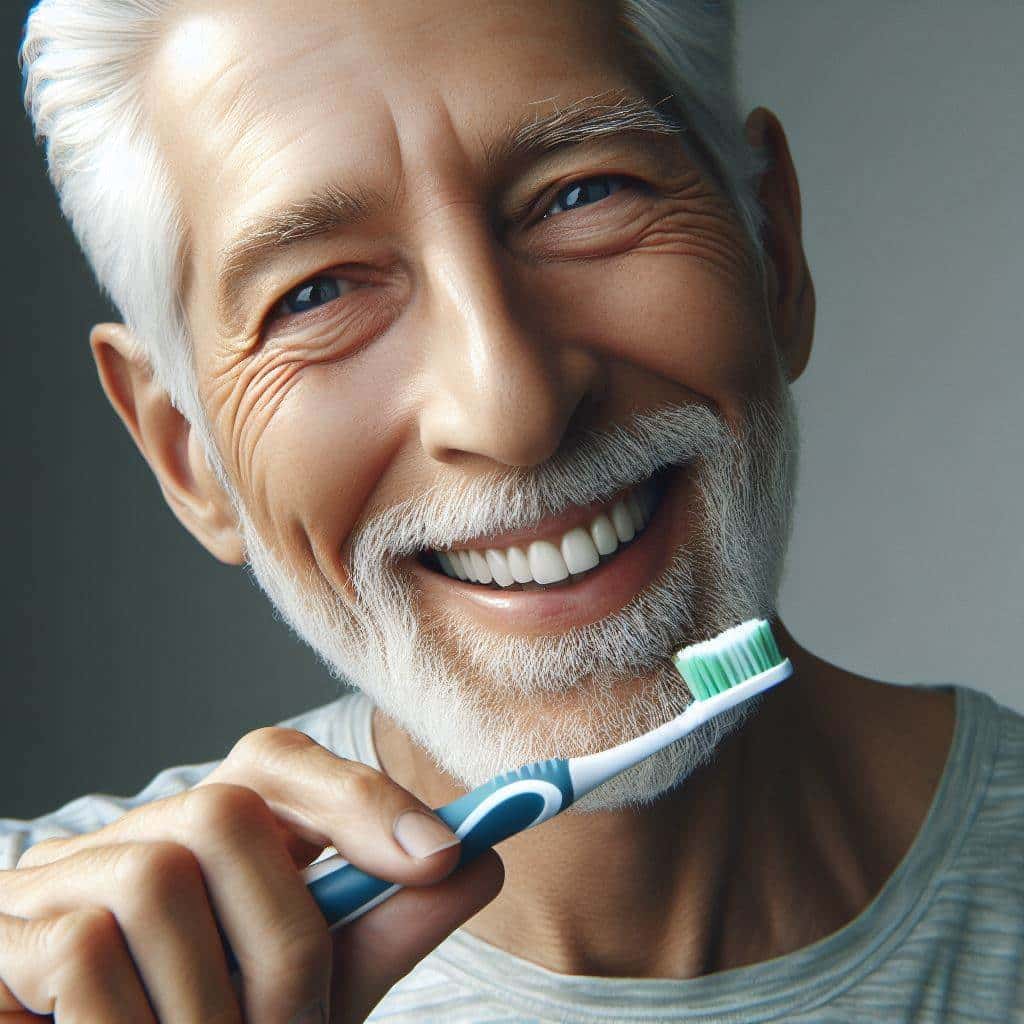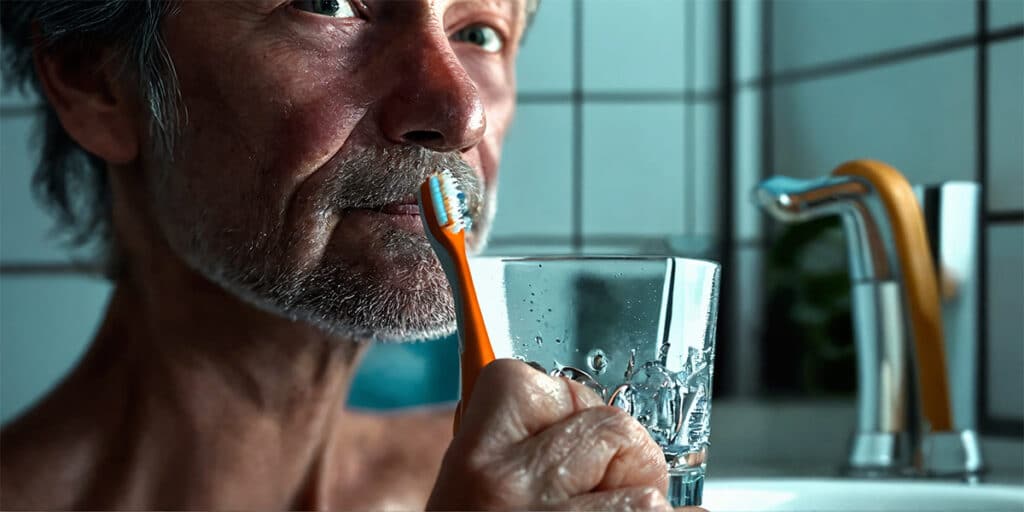- 1. Understanding Dry Mouth in Seniors: A Closer Look
- 2. Oral Hygiene Practices for Managing Dry Mouth
- 3. The Role of Diet and Hydration in Managing Dry Mouth
- 4. Advanced Dental Care for Seniors with Dry Mouth
- 5. Oral Health Remedies for Alleviating Dry Mouth
- 6. Dental Health Tips for Seniors with Dry Mouth: Your FAQs Answered
Dry mouth, a common concern among seniors, significantly impacts dental health, leading to increased risks of tooth decay, gum disease, and discomfort. This guide delves into expert dental health tips tailored for seniors navigating the challenges of dry mouth, offering practical advice to protect your oral health.
Understanding Dry Mouth in Seniors: A Closer Look
Dry mouth, medically known as xerostomia, is a prevalent condition among seniors, manifesting as a reduced ability to produce saliva. This reduction in saliva production can significantly impact oral health, digestive processes, and overall quality of life. To navigate the complexities of dry mouth in seniors, it’s essential to understand its causes, consequences, and the critical role saliva plays in maintaining oral health.
The Causes of Dry Mouth in Seniors
Several factors contribute to the occurrence of dry mouth in the elderly, each interplaying in unique ways:
Medication Side Effects: One of the most common culprits behind dry mouth in seniors are medications. Over 500 different medications, including antihypertensives, antidepressants, and antihistamines, list dry mouth as a side effect. The diverse range of medications underscores the need for careful management and review of prescription drugs in seniors’ healthcare plans.
Systemic Diseases: Certain systemic conditions, such as Sjögren’s syndrome, diabetes, and Parkinson’s disease, can directly affect saliva production, leading to dry mouth. These conditions highlight the importance of comprehensive healthcare management for seniors, addressing not just the symptoms but the underlying causes of dry mouth.
The Natural Aging Process: Although aging itself is not a direct cause of dry mouth, physiological changes that occur with age, such as reduced salivary gland efficiency, can contribute to the condition. Additionally, the cumulative effects of a lifetime of health conditions and medications can exacerbate the risk of developing dry mouth in later years.
The Role of Saliva in Oral Health
Saliva is often underrated in its importance to oral health and overall well-being. Beyond its role in moistening food for easier swallowing and digestion, saliva serves several key functions:
Tooth Protection: Saliva neutralizes acids produced by bacteria in the mouth, protecting teeth from decay. It acts as a constant rinse, washing away food particles and reducing the risk of cavities.
Disease Prevention: Enzymes and proteins in saliva play a crucial role in preventing infections by controlling bacterial and fungal growth in the mouth. This protective barrier is essential in reducing the risk of diseases such as gingivitis, periodontitis, and thrush.
Taste and Digestion: Saliva is instrumental in taste perception, as it dissolves food particles that stimulate taste receptors on the tongue. Moreover, enzymes like amylase initiate the digestion process, breaking down starches into simpler sugars.
Addressing the Implications of Dry Mouth
The impact of dry mouth extends beyond discomfort, posing significant challenges to seniors’ nutritional intake, oral hygiene, and overall health. Recognizing the multifactorial causes of dry mouth is the first step in crafting effective management strategies. This understanding underscores the necessity of a holistic approach in care, emphasizing the importance of saliva in maintaining oral health and the need for targeted interventions to alleviate the symptoms of dry mouth in seniors.
Oral Hygiene Practices for Managing Dry Mouth
For seniors grappling with dry mouth, maintaining optimal oral hygiene is not just a routine—it’s a crucial part of managing the condition and safeguarding dental health. Dry mouth can leave the mouth vulnerable to decay, infections, and discomfort. However, with the right practices, it’s possible to mitigate these risks significantly. Let’s delve into effective oral hygiene practices tailored for those dealing with dry mouth.
Brushing and Flossing Techniques for Dry Mouth
Brushing and flossing are foundational to oral hygiene but require specific adjustments when dealing with dry mouth.
Soft-Bristled Toothbrush: Choose a soft-bristled toothbrush that is gentle on the gums and teeth. Dry mouth can make oral tissues more susceptible to irritation and damage, making a softer brush ideal.
Fluoride Toothpaste: Opt for toothpaste containing fluoride. Fluoride helps protect the teeth by strengthening enamel and offering defense against decay, which individuals with dry mouth are particularly prone to.
Frequent, Gentle Brushing: Brush at least twice a day, and consider brushing after each meal to remove food particles and bacteria. Use gentle, circular motions to clean all surfaces of the teeth and gums.
Thorough Flossing: Floss daily to remove plaque and food particles from between the teeth, where a toothbrush can’t reach. For those with dry mouth, flossing helps prevent gum disease and tooth decay, which are risks due to reduced saliva.
The Importance of Fluoride Treatments
Fluoride plays a significant role in combating the effects of dry mouth by reinforcing tooth enamel and making it more resistant to decay.
Professional Fluoride Treatments: Regular visits to the dentist for professional fluoride treatments can provide a higher concentration of fluoride than over-the-counter products, offering enhanced protection against cavities.
Fluoride Mouthwash: Incorporating a fluoride mouthwash into your daily routine can offer additional support, especially after brushing at night. Ensure the mouthwash is alcohol-free to avoid further drying the mouth.
Choosing the Right Oral Care Products
Not all oral care products are suitable for individuals with dry mouth. Selecting products specifically designed for dry mouth can make a significant difference in comfort and effectiveness.
Alcohol-Free Products: Alcohol can exacerbate dry mouth symptoms. Look for alcohol-free mouthwashes and toothpaste that cater to dry mouth conditions.
Saliva Stimulants and Substitutes: There are over-the-counter products available, such as lozenges, gums, or sprays, that stimulate saliva production or act as saliva substitutes. These can be particularly helpful throughout the day for moisture and comfort.
Hydrating Mouthwash: Choose a mouthwash designed for dry mouth, often labeled as “hydrating” or “for dry mouth.” These formulas help add moisture and protect against decay without the drying effects of alcohol.
The Role of Diet and Hydration in Managing Dry Mouth
Diet and hydration are pivotal in the management of dry mouth, not only in alleviating the immediate discomfort but also in promoting long-term oral health. By carefully selecting what you eat and drink, you can significantly impact saliva production, a crucial element in combating dry mouth symptoms. Let’s explore how to navigate your dietary choices to optimize oral hydration and health.
Hydrating Foods and Drinks That Stimulate Saliva
Incorporating foods and drinks that naturally stimulate saliva production or are inherently hydrating can offer relief and comfort for those with dry mouth.
Fruits and Vegetables with High Water Content: Foods like cucumbers, celery, watermelon, and strawberries have high water content and can help keep you hydrated. Chewing these foods also stimulates saliva flow, providing double the benefit.
Sugar-Free Chewing Gums and Candies: Chewing stimulates saliva production, and opting for sugar-free varieties ensures you’re not adding to the risk of cavities while trying to combat dry mouth.
Herbal Teas: Certain herbal teas, such as ginger or green tea, can promote saliva production. Avoiding caffeine is key, as it can be dehydrating.
Foods and Beverages to Avoid
Some foods and drinks can exacerbate dry mouth symptoms or contribute to oral health issues if saliva flow is low.
Caffeinated Beverages: Coffee, black tea, and some sodas can contribute to dehydration. Opt for their caffeine-free versions or better yet, choose hydrating drinks.
Alcoholic Drinks: Alcohol is a diuretic and can dry out the mouth. It’s best to limit alcohol consumption or choose alcohol-free alternatives.
Salty and Spicy Foods: These can irritate a dry mouth and further reduce the sensation of moisture. Opt for milder, water-rich foods instead.
Acidic Foods and Beverages: Citrus fruits and juices, tomatoes, and similar acidic foods can aggravate dry mouth and harm tooth enamel, especially when saliva is scarce.
Tips for Staying Hydrated
Staying well-hydrated is fundamental in managing dry mouth, and there are effective strategies to ensure you’re getting enough fluids throughout the day.
Carry a Water Bottle: Having water on hand encourages regular sips throughout the day, keeping your mouth moist and aiding overall hydration.
Set Hydration Reminders: In our busy lives, it’s easy to forget to drink water. Setting reminders on your phone or using a hydration tracking app can help maintain regular fluid intake.
Incorporate Hydrating Foods into Meals: Make water-rich foods a staple in your diet. Incorporating soups, smoothies, and hydrating fruits and vegetables into your meals can help boost your overall fluid intake.
Rinse After Eating: If your mouth feels dry after meals, rinsing with water can help remove food particles and provide temporary relief. For an added boost, use an alcohol-free, hydrating mouth rinse designed for dry mouth.
| Product Type | Name | Benefits |
|---|---|---|
| Hydrating Mouthwash | HydroSplash | Moisturizes the mouth, alcohol-free |
| Saliva-Stimulating Lozenges | SalivaBoost | Stimulates saliva production, sugar-free |
| Fluoride Toothpaste | FluoroCare | Prevents cavities, formulated for dry mouth |
| Soft-Bristled Toothbrush | GentleClean | Protects gums, effective cleaning |
| Oral Hydration Gel | MoistureGel | Long-lasting oral moisture, safe for nightly use |
Advanced Dental Care for Seniors with Dry Mouth
When seniors face the challenges of severe dry mouth, turning to professional dental care can unveil a variety of solutions tailored to alleviate symptoms and prevent further oral health complications. Regular dental check-ups and cleanings become even more critical for individuals suffering from dry mouth. These appointments allow dental professionals to closely monitor the health of your mouth, removing plaque build-up and addressing any early signs of tooth decay or gum disease that are exacerbated by reduced saliva flow.
Saliva substitutes and prescription treatments are often recommended by dentists and doctors to manage severe cases of dry mouth. Saliva substitutes can mimic some of the properties of saliva, providing temporary relief from the discomfort associated with dry mouth. Prescription treatments, such as medications that stimulate saliva production, can offer more long-term solutions for those whose dry mouth results from systemic issues or side effects of medication.
Protective measures against tooth decay and gum disease are paramount for seniors with dry mouth. Fluoride treatments, either applied in the dental office or through prescription-strength toothpaste, can help strengthen tooth enamel and protect against decay. Dental professionals may also recommend specific oral hygiene products designed for sensitive mouths, further guarding against the heightened risk of gum disease.
Oral Health Remedies for Alleviating Dry Mouth
Navigating the challenges of dry mouth, particularly in seniors, requires a thoughtful, multifaceted approach. The journey toward mitigating symptoms and enhancing oral health encompasses not just adopting a series of practices but understanding the core principles behind effective dry mouth management. Here are the essential takeaways to guide you through this journey.
Personalized Oral Care Regimen
A one-size-fits-all solution does not exist for managing dry mouth because individual experiences and causes can vary widely. Tailoring your oral hygiene routine to fit your specific needs is not just beneficial—it’s necessary. This customization might involve selecting specific toothpaste formulations, mouth rinses, or even the frequency and method of brushing and flossing that best suits your condition. Recognizing the importance of this personalized approach is the first step toward effectively managing dry mouth symptoms. It acknowledges the unique factors contributing to each individual’s experience and adapts the oral care strategy accordingly, ensuring that measures taken are both effective and sustainable in the long term.
Dietary Adjustments for Hydration
The role of diet in managing dry mouth extends beyond mere nutrition. Certain foods and beverages can actively promote saliva production or, conversely, exacerbate dryness. Incorporating hydrating foods such as fruits with high water content, vegetables, and saliva-stimulating substances like sugar-free gums and candies into your diet can provide relief. Moreover, being mindful of dehydrating agents like caffeine and alcohol, and minimizing their intake, can prevent the aggravation of dry mouth symptoms. These dietary adjustments, when implemented thoughtfully, can significantly alleviate dry mouth, contributing to an enhanced quality of life.
Professional Guidance Is Invaluable
While individual efforts in managing dry mouth are crucial, the guidance of dental and healthcare professionals is invaluable. Regular dental check-ups enable early detection and management of potential complications arising from dry mouth, such as tooth decay and gum disease. Dental professionals can also provide tailored advice on oral hygiene practices and recommend specific products suited to your needs. Moreover, healthcare providers can review your medications and overall health condition, identifying and addressing systemic causes of dry mouth. This professional input ensures that your approach to managing dry mouth is not only comprehensive but also aligned with your overall health strategy.
Dental Health Tips for Seniors with Dry Mouth: Your FAQs Answered
How often should seniors with dry mouth brush their teeth?
Brush at least twice a day using fluoride toothpaste. Consider brushing after meals to remove debris and bacteria.
Are saliva substitutes effective for managing dry mouth?Are saliva substitutes effective for managing dry mouth?
Yes, saliva substitutes can provide temporary relief from dry mouth symptoms by moisturizing the mouth.
Can certain foods help alleviate dry mouth symptoms?
Yes, foods high in water content such as cucumbers, melons, and berries can help keep the mouth moist.
How does staying hydrated affect dry mouth?
Drinking plenty of water throughout the day helps maintain moisture in the mouth, essential for managing dry mouth.
Is it necessary to use a specific type of toothbrush?
Yes, use a soft-bristled toothbrush to prevent irritation to sensitive gums and teeth affected by dry mouth.
What role does fluoride play in dental care for seniors with dry mouth?
Fluoride strengthens tooth enamel and helps prevent decay, which is crucial since dry mouth increases the risk of cavities.
Should alcohol-based mouthwashes be avoided?
Yes, alcohol can further dry out the mouth. Look for alcohol-free mouthwashes designed for dry mouth.
How can seniors stimulate saliva production?
Chewing sugar-free gum or sucking on sugar-free lozenges can stimulate saliva flow.
Are regular dental check-ups important for seniors with dry mouth?
Yes, regular dental visits are crucial for monitoring oral health, receiving fluoride treatments, and getting professional advice.
Can medications contribute to dry mouth, and what can be done about it?
Many medications have dry mouth as a side effect. Consult with a healthcare provider for potential adjustments or treatments to mitigate this side effect.
Citations
- Villa, A., Connell, C. L., & Abati, S. (2015). “Diagnosis and Management of Xerostomia and Hyposalivation.” Therapeutics and Clinical Risk Management, 11, 45-51. This study provides a comprehensive overview of the causes of dry mouth and offers guidance on diagnosis and management strategies, emphasizing the importance of personalized care.
- Sreebny, L. M., & Valdini, A. (1988). “Xerostomia: A Neglected Symptom.” Archives of Internal Medicine, 148(6), 1333-1337. This article highlights the impact of dry mouth on quality of life and the importance of recognizing this condition in clinical practice.
- Dodds, M. W., Johnson, D. A., & Yeh, C. K. (2005). “Health Benefits of Saliva: A Review.” Journal of Dentistry, 33(3), 223-233. This review details the protective roles of saliva in oral health, underlining why managing dry mouth is crucial for maintaining dental health, especially in seniors.
- Porter, S. R., Scully, C., & Hegarty, A. M. (2004). “An Update of the Etiology and Management of Xerostomia.” Oral Surgery, Oral Medicine, Oral Pathology, Oral Radiology, and Endodontics, 97(1), 28-46. Offering an update on dry mouth’s causes and management, this article discusses various treatment strategies, including dietary adjustments and the use of saliva substitutes.








